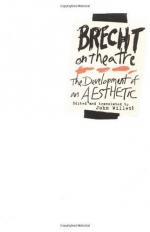
|
| Name: _________________________ | Period: ___________________ |
This test consists of 15 multiple choice questions and 5 short answer questions.
Multiple Choice Questions
1. Life of Galileo has the main character giving a boy a lesson on _____.
(a) The solar system.
(b) Color theory.
(c) The Bible.
(d) Didactics.
2. In Neher's Antigone, what sits on four posts as part of the setting?
(a) Horse skulls.
(b) Rocks.
(c) Human skulls.
(d) Pots.
3. What is Brueghel's great war painting called?
(a) The Conversion of Saul.
(b) The Fall of Icarus.
(c) The Archangel Michael.
(d) Dulle Griet.
4. Piscator's theater was characterized as the most _____ theatre.
(a) Demanding.
(b) Radical.
(c) Ordinary.
(d) Calculating.
5. Laughton gave readings of _____ at Brecht's house.
(a) Goelik.
(b) Stanislavski.
(c) Shakespeare.
(d) Goethe.
6. Brecht calls realistic acting _____ acting.
(a) Keyhole.
(b) Drugstore.
(c) Window pane.
(d) Rabbit hole.
7. Speech of outstanding _____ is discouraged in epic theatre.
(a) Clarity.
(b) Pace.
(c) Charisma.
(d) Volume.
8. How is the dialogue divided in Der Messingkauf?
(a) Into seventeen stanzas.
(b) Into three years.
(c) Into sixty chapters.
(d) Into four nights.
9. What nationality of horsemen are depicted in Christ Carrying the Cross?
(a) Turkish.
(b) Spanish.
(c) Flemish.
(d) Moorish.
10. Who jeered at Galileo in the play of the same name?
(a) His siblings.
(b) The monks of the Collegium Romanum.
(c) His rivals.
(d) The nuns of Gloucester.
11. The Berliner Ensemble didn't believe in cutting new actors off from _____.
(a) Marxist propaganda.
(b) Real life.
(c) Print media.
(d) Bourgeois values.
12. After the moral and material collapse of Germany, the country had a vague appetite for _____.
(a) Classicism.
(b) Drama.
(c) Novelty.
(d) Aleatoric elements.
13. Why was Antigone picked up for production?
(a) Its characterization.
(b) Its sets.
(c) Its sense of drama.
(d) Its timely subject matter.
14. _____temperament in epic theatre is discouraged.
(a) Angry.
(b) Indulgent.
(c) Docile.
(d) Obtrusive.
15. Brecht states that art is no Land of _____.
(a) The Lost.
(b) Cockaigne.
(c) Love.
(d) Milk and Honey.
Short Answer Questions
1. Brecht sees his epoch as having a _____ enjoyment of theatre than the ancients had.
2. _____ means intelligible to the broad masses.
3. What signified a broad flow of popular musical elements into modern music?
4. Brecht states that it is not the job of the Marxist-Leninist party to organize production of poetry as on a _____.
5. How does Brecht describe the confusion of styles present in European theatre in his time?
|
This section contains 346 words (approx. 2 pages at 300 words per page) |

|




